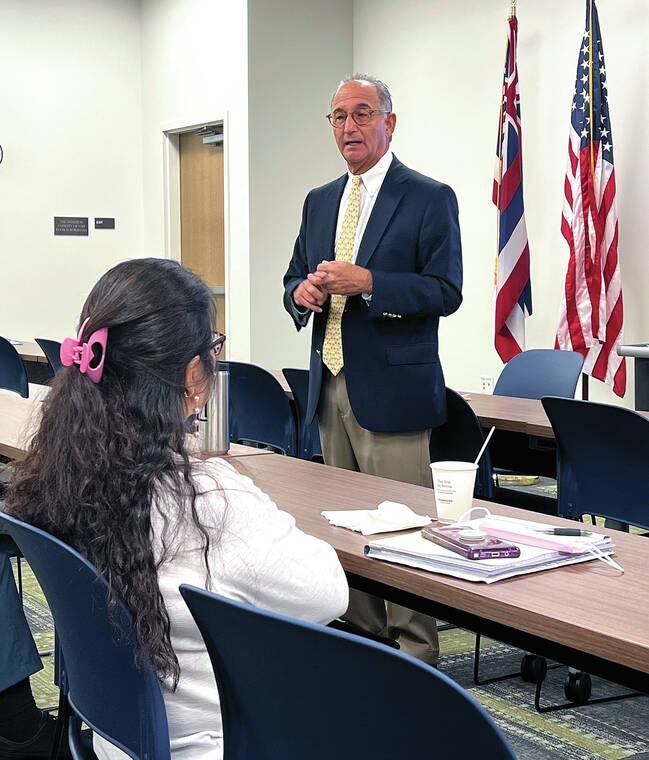A possible solution to decrease the revolving door of incarceration for people suffering serious mental illness and substance use disorder in Hawaii was proposed Thursday at a summit held by the state Judiciary at Keahuolu Courthouse.
Miami-Dade County Associate Administrative Judge Steven Leifman presented the model his Florida community has used to effectively address the needs of those with mental illness and substance abuse issues to dozens of Hawaii County stakeholders, including members of the Judiciary, law enforcement, health care and more.
“There really is no greater failed public policy in the United States than our treatment of people with severe mental illness,” said Leifman.
He said 70% of people incarcerated in jails have either a serious mental illness and/or a substance use disorder.
“We need to start to rethink what we are doing because our outcomes are horrible,” he said.
That’s particularly evident with the United States having just 4% of the world’s population, but accounting for 25% of the global prison population, he said.
“If you peel back that onion and try to figure out why, what you are going to find is that most of this is because of untreated mental illnesses,” Leifman said. “We are getting frustrated. It’s overwhelming the system that is not built for it.”
Leifman said the Conference of Chief Justices, an association of the top judicial officials in all 50 states, formed the National Judicial Task Force to Examine State Courts’ Response to Mental Illness three years ago. He was a member of the panel tasked with studying how to assist state courts in more effectively responding to the needs of court-involved individuals with serious mental health and substance use issues.
Every justice, Leifman said, endorsed the initiative’s findings, and called for a four-year implementation plan for all 33,000 courts in America to change their response in dealing with individuals that have severe mental illness.
“We came to Hawaii first because there is a lot of goodwill, and if we can get this done on a state level here, we can learn how to get other states to do it,” he said.
Leifman added that he spent three years on the Florida Supreme Court and was among those tasked with studying the issue of recidivism among persons with mental illness or are substance abuse issues.
“What we found was pretty fascinating. In Florida, which is pretty typical, at the time we were spending one-third of the entire mental health budget on competency hearings,” he said. “As we dug a little deeper, what we found was that 80% of those people had one of three things happen. They had the charges dropped, they got credit for time served or they got probation, walking out the door without any access to services. It’s absolutely the definition of insanity.”
Leifman said the study also found most states are spending more money to incarcerate people than to treat them.
“The evidence is strong that if we do this right, we can get much better outcomes than what we are doing today,” he said.
The key is to get ahead of the illness, handle it early and give people the opportunity to recover, he said, noting the Miami-Dade County court system uses a two part approach: pre-arrest diversion and a post-arrest diversion systems that each work to identify persons with such conditions and get them in to treatment. Doing so required a collaboration between many entities: the state attorney, public defender, department of children and families, law enforcement and providers. They all agreed to step up, he said.
Leifman explained the best pre-arrest program, referred to as “crisis intervention team policing,” was actually started by the Memphis Police Department. It teaches law enforcement how to identify someone in crisis, how to de-escalate the situation and where to take people as opposed to arresting them.
The Miami-Dade County court system also uses a screening tool to identify a serious mental issue when a person is first incarcerated. To do so, the person is segregated at the jail and seen by a psychiatrist within 24 hours. If the doctor determines commitment is required, the individual is moved to a crisis stabilization unit within three days.
Once the person begins to stabilize, the individual can agree to enter the court treatment program. Charges can be dropped if the person successfully completes the program.
“When we started it was just non-violent misdemeanor cases. In two years, our recidivism rate went from 75% to 20%. We have two choices: We can release people with treatment or without treatment. For most people, if you get them the right services, they are going to do real well,” he said.
Seeing the program’s success, the treatment program was expanded to all misdemeanors and felony cases. Felony recidivism dropped from 75% to 25%, saving the county 84 years of jail bed days, which Leifman said equates to hundreds of millions of dollars.
Leifman said he is committed to working with Hawaii courts to find what would work best, as the approach taken by Florida is not a one-size-fits-all solution.
“We will help you working with the chief justices and all your governmental entities figuring out what is a better system. Let’s figure out a better way to get people services,” he said. “It’s all about collaboration.”
Email Laura Ruminski at lruminski@westhawaiitoday.com.






